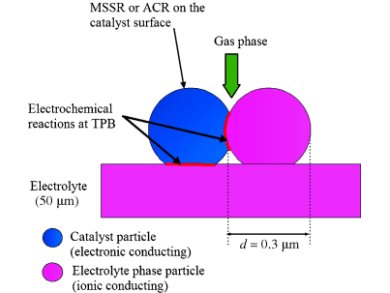Local thermal equilibrium (LTE) is a common assumption used in thermal modeling of solid oxide fuel cells (SOFCs). However, its validity had not been fully verified.
Keqing Zheng, Qiong Sun, and Meng Ni, Hong Kong Polytechnic University, PR China, developed a thermal model to evaluate the local thermal non-equilibrium effect of SOFC electrodes with various fuels, considering methane internal reforming and ammonia thermal cracking in the anode.
Unlike previous studies, the team used the cell half-reaction in the calculation for heat generation/consumption at the electrode. Although the local thermal non-equilibrium effect for ammonia-fed SOFCs was more pronounced than that for hydrogen-fed SOFCs, the results show that the local thermal equilibrium assumption can be safely adopted for SOFC modeling for a wide range of operating/structural parameters and for various fuels, such as hydrogen, ammonia, and methane.
 Local Non-Equilibrium Thermal Effects in Solid Oxide Fuel Cells with Various Fuels,
Local Non-Equilibrium Thermal Effects in Solid Oxide Fuel Cells with Various Fuels,
K. Zheng, Q. Sun, M. Ni,
Energ. Technol. 2013,
DOI: 10.1002/ente.201200014Focussing on four hallmarks of energy research: generation, storage, conversion, and distribution, Wiley’s new journal Energy Technology is dedicated to covering all aspects of energy process engineering from different perspectives.




